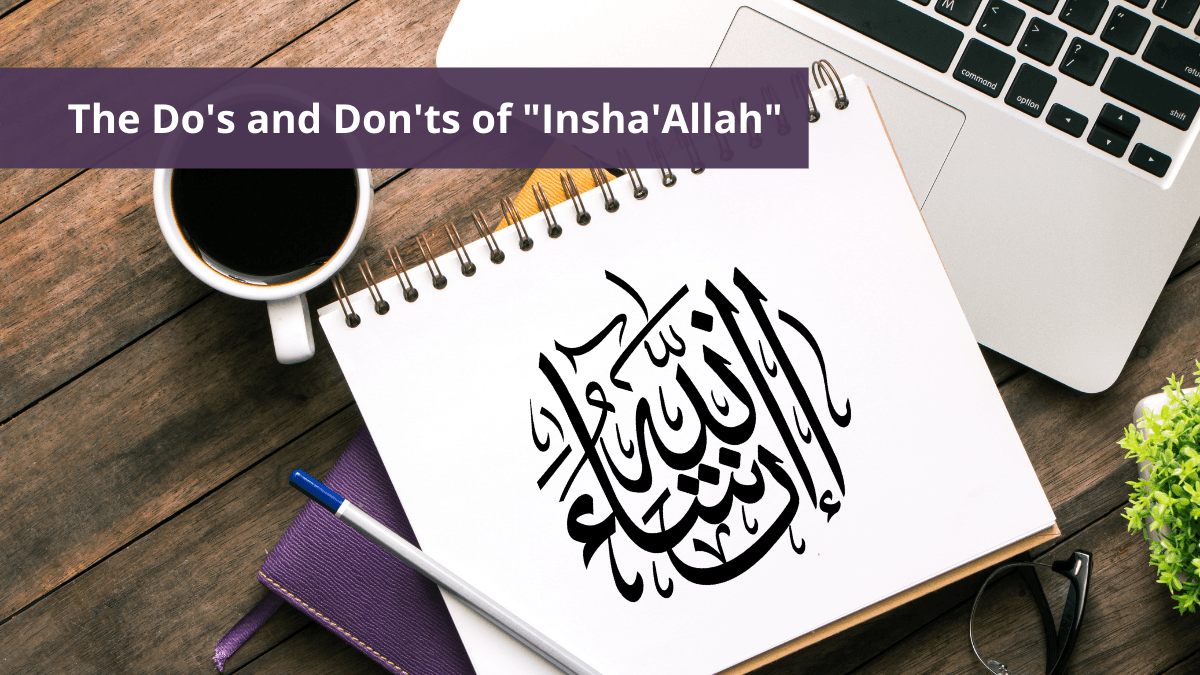US Phone: (855) 226-2848
Blog
Keep up with the latest in Arabic and Quran with Studio Arabiya!
The Do's and Don'ts of "Insha'Allah"
inshallah meaning
The Islamic phrase "insha'Allah" is well known by Muslims and non-Muslims alike. But do we really understand what it means or when and how to say it? Why do we even say "insha'Allah"? And even as importantly: do we know when NOT to say it? Read on to find out and feel free to share the khayr so that it can benefit others, insha'Allah :)
What does inshallah mean?
How to write insha allah?
When writing "insha'Allah" in Arabic, it is important to know that the phrase is made of three separate words, which gives the phrase its true meaning "if Allah wills".
How to write inshallah in Arabic?
In Arabic, إِن [in] means "if", شَاءَ [shā'a] means "(He) willed", and الله [Allāh] means "God Almighty (the True and Only One)". By combining these three words together in Arabic, the phrase would carry a different meaning, which is important to avoid. When writing the transliteration of this phrase in other languages, it is acceptable to combine the words or keep them separate as long as the pronunciation is clear and understandable in that language. Mufti Menk has recorded a very useful video recently about a common misunderstanding around how we write it in transliteration. Watch here!
A misused and misunderstood phrase
"Insha'Allah" should always be used when talking about future hopes, plans, and promises. Unfortunately, there is a growing misunderstanding around this phrase. Many Muslims are indeed misusing it, taking away its profound and important meaning, and use it as a way to politely (or sometimes even sarcastically) say "no" or "maybe" when they do not want to commit to a plan or request, or think that it will very unlikely happen. As a result, many non-Muslims have come to misunderstand this phrase as well, and might even use it themselves in the wrong way. Let's go back to basics and look at the true meaning and appropriate usage of "insha'Allah".
Allah SWT says in the Quran:
وَلَا تَقُولَنَّ لِشَيْءٍ إِنِّي فَاعِلٌ ذَٰلِكَ غَدًا إِلَّا أَن يَشَاءَ اللَّـهُ ۚ وَاذْكُر رَّبَّكَ إِذَا نَسِيتَ وَقُلْ عَسَىٰ أَن يَهْدِيَنِ رَبِّي لِأَقْرَبَ مِنْ هَـٰذَا رَشَدًا
And never say of anything, "Indeed, I will do that tomorrow," Except [when adding], "If Allah wills." And remember your Lord when you forget [it] and say, "Perhaps my Lord will guide me to what is nearer than this to right conduct." (Surah Al-Kahf, 18:23-24)
It is very clear from these ayaat that we should always say "insha'Allah" when we say we will do something, no matter how close or far in time this action might be, whether it's about going somewhere in the afternoon or the day after, purchasing a car next month or going to Hajj next year (may Allah SWT allow us all to visit His House soon, say ameen!). This is a commandment from Allah SWT.
Another very important lesson we get from these beautiful ayaat and from the Sunnah of the Prophet (peace and blessings be upon him) is the idea that we still need to commit, put in our best effort and have the true intention (in our heart and in the tone we use) to complete this action for which we say "insha'Allah": "I will do everything in my ability to complete this, if Allah wills.". We do not know what will happen in the future as we recognize that it is all in Allah's Hands, but we should still have the right intention in our heart and do our best to complete the task or join the event.
When NOT to say "insha'Allah"
We mentioned earlier how the phrase "insha'Allah" is sometimes being used in a polite or sarcastic manner to mean "no" or "maybe": this should never be done. Saying "insha'Allah" is a commandment from Allah SWT, and, as such, we should never minimize it, make fun of it, or convey the wrong meaning about it to others.
Additionally, there is one situation where we should not say "insha'Allah": when we make dua (supplication).
Abu Huraira reported Allah's Messenger (ﷺ) as saying: "When one of you makes a supplication (to his Lord) one should not say: O Allah, grant me pardon, if You so like, but one should beg one's (Lord) with a will and full devotion, for there is nothing so great in the eye of Allah which He cannot grant." (Sahih Muslim 2679 a)
When making dua for yourself or for others, be filled with trust in Allah SWT and hope that He SWT will grant what you ask for, and never add "insha'Allah". Instead, you may and should say "if this is better for me then facilitate it for me, and if it is not good for me, then keep it away from me" or something similar.
Remember to say "insha'Allah", do your best, and leave the rest to Allah SWT
When discussing our future hopes, plans, goals, and promises we should never fail to follow it with "insha'Allah". This was a commandment given to us by The Almighty which we must always strive to keep and follow if we want success in this life and in the Hereafter. By keeping Allah SWT at the forefront of our minds, we can feel at peace and have hope that He will always provide what is best for us.
Related Posts
Comments
By accepting you will be accessing a service provided by a third-party external to https://studioarabya.com/


